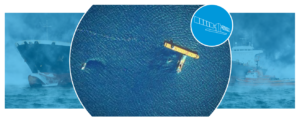
The Mediterranean Sea is both one of the world’s most sensitive marine environments and one of the busiest shipping lanes in the world. It is estimated that around 30% of all the world’s oil passes through the narrow straits of Gibraltar, the Suez Canal or the Bosphorus, with most of this passing close by the shores of Malta. Accidents are rare, but ships captains save time and money by illegally washing their tanks whilst sailing. The consequent pollution causes considerable environmental damage to the marine ecosystem and leaves traces of oil on beaches otherwise enjoyed by bathers and holiday makers.
National authorities are responsible for monitoring their own waters, but they are helped in this by the CleanSeaNet (CSN) service operated by the European Maritime Safety Agency (EMSA). CSN uses Sentinel-1 and other data to identify potential oil slicks and possible polluters and, in a matter of minutes, transfer this information to the national competent authorities such as SASEMAR in Spain and Transport Malta. The increased risk of detection and successful prosecution is deterring ship’s captains from washing out their tanks and oil spills were reduced by up to 65% in the last 10 years.